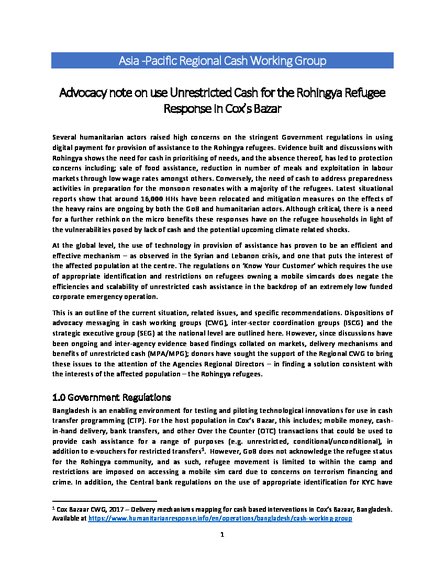
Several humanitarian actors raised high concerns on the stringent Government regulations in using digital payment for provision of assistance to the Rohingya refugees. Evidence built and discussions with Rohingya shows the need for cash in prioritising of needs, and the absence thereof, has led to protection concerns including; sale of food assistance, reduction in number of meals and exploitation in labour markets through low wage rates amongst others. Conversely, the need of cash to address preparedness activities in preparation for the monsoon resonates with a majority of the refugees. Latest situational reports show that around 16,000 HHs have been relocated and mitigation measures on the effects of the heavy rains are ongoing by both the GoB and humanitarian actors. Although critical, there is a need for a further rethink on the micro benefits these responses have on the refugee households in light of the vulnerabilities posed by lack of cash and the potential upcoming climate related shocks.
At the global level, the use of technology in provision of assistance has proven to be an efficient and effective mechanism – as observed in the Syrian and Lebanon crisis, and one that puts the interest of the affected population at the centre. The regulations on ‘Know Your Customer’ which requires the use of appropriate identification and restrictions on refugees owning a mobile simcards does negate the efficiencies and scalability of unrestricted cash assistance in the backdrop of an extremely low funded corporate emergency operation.
This is an outline of the current situation, related issues, and specific recommendations. Dispositions of advocacy messaging in cash working groups (CWG), inter-sector coordination groups (ISCG) and the strategic executive group (SEG) at the national level are outlined here. However, since discussions have been ongoing and inter-agency evidence based findings collated on markets, delivery mechanisms and benefits of unrestricted cash (MPA/MPG); donors have sought the support of the Regional CWG to bring these issues to the attention of the Agencies Regional Directors – in finding a solution consistent with the interests of the affected population – the Rohingya refugees.
Links
Resource collections
- Innovation
- UN Habitat - Urban Response Collection
- Urban Response - Urban Crisis Preparedness and Risk Reduction
- Urban Response Collection - Community Engagement and Social Cohesion
- Urban Response Collection - Economic Recovery
- Urban Response Collection - Environment and Climate Change
- Urban Response Collection - Housing, Land and Property
- Urban Response Collection - Urban Crisis Response, Recovery and Reconstruction
- Urban Response Collection - Urban Resilience